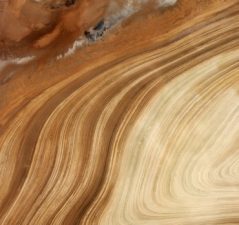 Professor Mohammed Kassas in his office at Cairo University, photographed by Louise Sarant
Professor Mohammed Kassas in his office at Cairo University, photographed by Louise Sarant
If Hassan Fathy is the Middle East’s father of sustainable architecture, then Mohamed Kassas is the prophet of desertification. The spry ninety year old Egyptian Professor of Botany told Almasry Alyoum that his love of nature sprouted in a fishing village along the shores of the Mediterranean, where people understood and accommodated nature’s cyclical temperament. He left to study in Cairo and then taught for a spell at the University of Khartoum in Sudan. It was there that Kassas discovered desertification before bringing it to the world’s attention.
Kassas told the paper that he studied the vegetation belts in Sudan, once clearly delineated by a wetter south or drier north during a three year teaching stint. Thirty years old between 1953 and 1956, the maps were clearly outdated.
The Botany Professor realized that the vegetation belts were receding to the south at a worrying rate of several kilometers a year – expanding the desert. This was not because the desert was spreading, but because productive lands were being improperly managed, overgrazed, poorly drained, and degraded.
Kassas took his concerns and subsequent studies to a 1969 international conference on arid lands held in Virginia. It was then that the term “desertification” first became ubiquitous. Until then, the problems that the Egyptian botanist revealed were not properly understood.
The following decade ushered in one of the worst periods of drought that increased the rate of desertification.
“Desertification became such a menace that the United Nations decided to hold the first world conference on desertification in Nairobi in 1977,” Kassas told Bikya Masr. Addressing desertification became an international priority.
“When you want to combat desertification, Kassas explains, you need to correct management systems on the land to make sure that the number of livestock heads is right, and respect the line when you should not cultivate more.”
Desertification is still a menace, perhaps more so three decades after Kassas first coined the term. But just how much our awareness has grown is largely thanks to a man who dared to lead an environmental impact assessment on President Gamal Abdel Nasser’s high dam project, and who was dispelled from the Shura Council for criticizing the Toshka project – a plan to divert water from Lake Nasser for agriculture.
Although his term as president of the International Union for the Conservation of Nature lasted only six years, from 1978 to 1984, his legacy in Egypt will be eternal.
More on environmental issues in Egypt:
Twelve Million Egyptians to be Affected by Climate Change
Egyptian Children Track Environmental Change With Disposable Cameras
Egypt Turns to Earthworms to Save its Environment




Yes, i think it may be understatement of the year to say desertification is still a menace. Hmm i think so, given the wisdom of using underground aquifiers to grow populations in the middle east.
Heres an idea. Dig giant trenches along the coast, let the sea fill up groundwells, with the ground filtering out the bad stuff, then just pump it to people, or bring people to it. Cheaper and much more sustainable.